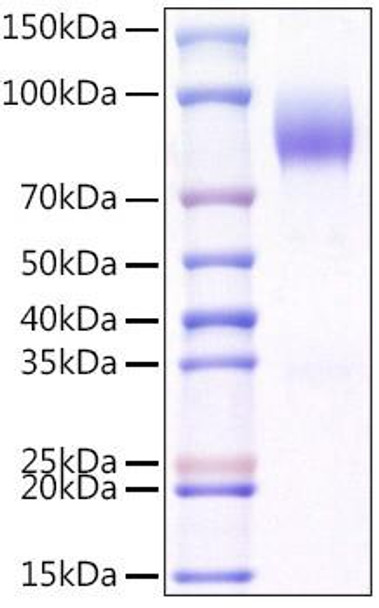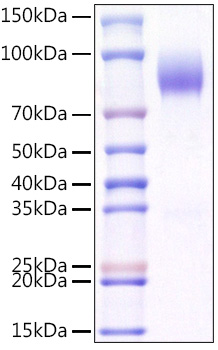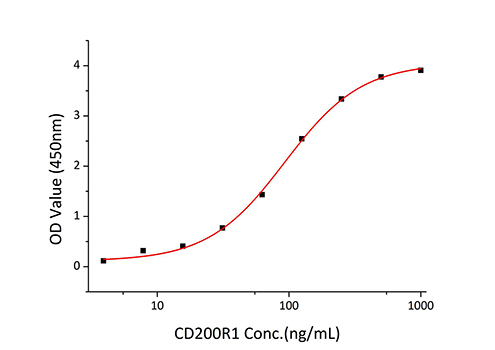Description
Recombinant Mouse CD200R1 Protein
The Recombinant Mouse CD200R1 Protein is a high-quality recombinant protein designed for murine biological research applications. This protein serves as an essential reagent in mouse model studies, comparative immunology research, and preclinical therapeutic evaluations, enabling scientists to investigate CD200R1 biology and its relevance to human disease mechanisms through translational research approaches.
This product (SKU: RPCB1570) is produced using HEK293 cells and features a C-hFc&Avi tag for convenient detection and purification. The protein exhibits a calculated molecular weight of 50.89 kDa with an observed molecular weight of 75-100 kDa under denaturing conditions, achieving ≥ 95 % as determined by SDS-PAGE.. Functional bioactivity has been validated through rigorous quality control assays, confirming its suitability for demanding research applications.
Key Features
| High Purity by Affinity Chromatography | |
| Mammalian & Bacterial Expression Systems | |
| High lot-to-lot consistency via strict QC |
| Product Name: | Recombinant Mouse CD200R1 Protein |
| SKU: | RPCB1570 |
| Size: | 10 μg , 20 μg , 50 μg , 100 μg |
| Reactivity: | Mouse |
| Synonyms: | CD200R, CRTR2, MOX2R, OX2R, CD200R1 |
| Tag: | C-hFc&Avi |
| Expression Host: | HEK293 cells |
| Calculated MW: | 50.89 kDa |
| Observed MW: | 75-100 kDa |
| Gene ID: | 57781 |
| Protein Description: | High quality, high purity and low endotoxin recombinant Recombinant Mouse CD200R1 Protein (RPCB1570), tested reactivity in HEK293 cells and has been validated in SDS-PAGE.100% guaranteed. |
| Endotoxin: | < 0.1 EU/μg of the protein by LAL method. |
| Purity: | ≥ 95 % as determined by SDS-PAGE. |
| Formulation: | Lyophilized from a 0.22 μm filtered solution of PBS, pH 7.4. |
| Bio-Activity: | Measured by its binding ability in a functional ELISA. Immobilized Human CD200 Protein at 2μg/mL (100 μL/well) can bind mouse CD200 R1 with a linear range of 3.9-92.9ng/mL. |
| Reconstitution: | Centrifuge the vial before opening. Reconstitute to a concentration of 0.1-0.5 mg/mL in sterile distilled water. Avoid vortex or vigorously pipetting the protein. For long term storage, it is recommended to add a carrier protein or stablizer (e.g. 0.1% BSA, 5% HSA, 10% FBS or 5% Trehalose), and aliquot the reconstituted protein solution to minimize free-thaw cycles. |
| Storage: | Store at -20℃.Store the lyophilized protein at -20℃ to -80 ℃ up to 1 year from the date of receipt. After reconstitution, the protein solution is stable at -20℃ for 3 months, at 2-8℃ for up to 1 week. |
The cluster of differentiation (CD) system is commonly used as cell markers in Immunophenotyping. Different kinds of cells in the immune system can be identified through the surface CD molecules associating with the immune function of the cell. There are more than 320 CD unique clusters and subclusters have been identified. Some of the CD molecules serve as receptors or ligands important to the cell through initiating a signal cascade which then alter the behavior of the cell. Some CD proteins do not take part in cell signal process but have other functions such as cell adhesion. Cell surface glycoprotein CD200 receptor 1 (CD200R1) is an isoform of CD200 receptors that is expressed on cells of the myeloid lineage. CD200R1 is a receptor for the OX-2 membrane glycoprotein. The receptor-substrate interaction may serve as a myeloid downregulatory signal.








